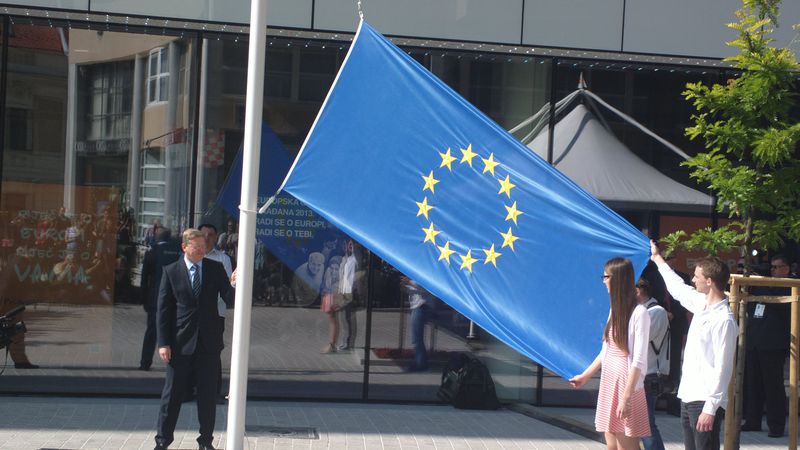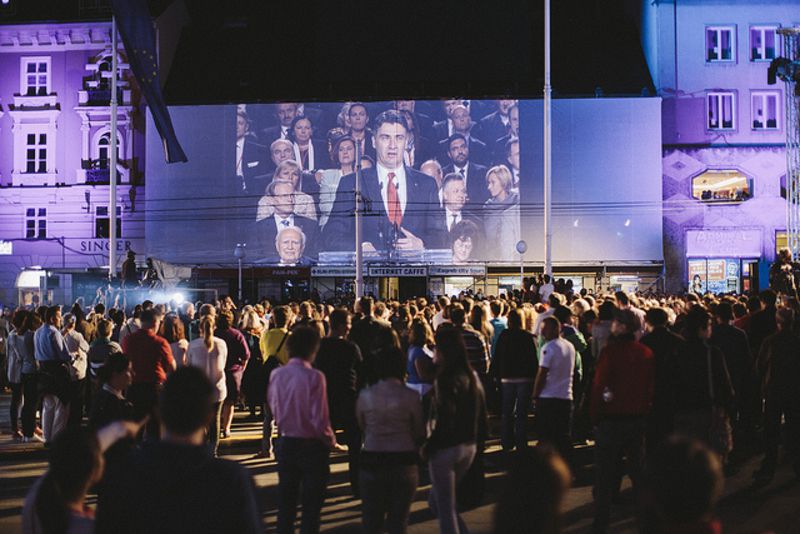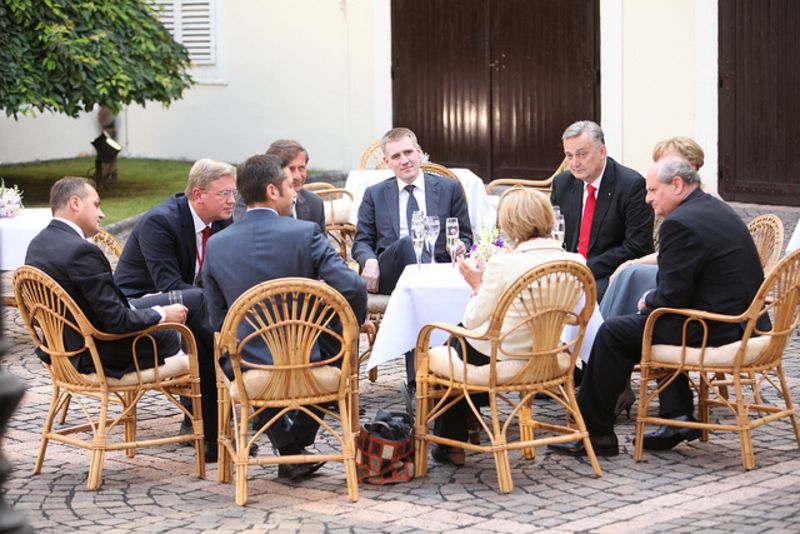The New EU Member State: Proud, Independent and in Recession
Adelina Marini, July 16, 2013
The accession of the 28th EU member state definitely marks the end of the European political romanticism that spread in Europe after World War II and that got a new boost after the fall of the Berlin wall. With Croatia's membership it could be said that a huge chapter of the European history has been closed. And although the EU is yet to expand toward former Yugoslavia - Montenegro and Serbia are in a negotiations process - this would be rather a technical process, filled with realism and pragmatism. Romance, if any, will not dominate the welcoming speeches. The trend for this was visible yet in 2007 when enlargement fatigue was heavily discussed, but with the accession of Croatia it could be felt unequivocally.
"Historically and culturally Croatia has always been a part of Europe. Today, with the accession to the European Union, Croatia returns to its rightful place in the European family", said European Parliament President Martin Schulz in the morning of July 1st during the opening of the House of Europe in Zagreb - the building that will host the European Commission representation and the information office of the European Parliament. Mr Schulz, as a socialist and idealist, was probably the only one who was emotional in his speech. According to him, Europe was still a magnet for peace and change and membership is a win-win situation for all. He, however, was quick to recall the realities. "Yes, ladies and gentlemen, we live in difficult times. Recession is hitting hard Croatia and many other countries in the EU. And let's be honest - EU membership will not offer magic solutions, but it will help to lift many people out of poverty and modernise the economy". Schulz also said that Croatia was to receive a lot of EU funds that will help the country build roads, clean the environment and increase research and development.
In Jose Manuel Barroso's statement, romanticism was also scanty. Moreover, after he hailed modestly Croatia's achievements for the past 20 years, he immediately pointed out his expectations to the 28th member: "Just as Croatians have changed Croatia, so your country can help change this part of Europe", Mr Barroso said, thus showing clearly that the expectation of the European Commission will be  Croatia to lead its former room mates in Yugoslavia toward their new home - a changing dynamically or even soon more abruptly European Union.
Croatia to lead its former room mates in Yugoslavia toward their new home - a changing dynamically or even soon more abruptly European Union.
The European president, Herman Van Rompuy, was quite concise and hinted to other commitments that could stem from Croatia's membership in the EU - not only to be a motor of Balkan enlargement, but to share its solidarity with the rest. "As new challenges arise, you will discover that membership is not just about respecting and shaping rules, but as much about sharing the responsibility for our common endeavour. In weather fair and foul, 'for better and for worse', we must remain united as a Union", were the words of the European Council chief who reaffirmed the feeling of many Croatians in the night of accession that they were actually witnessing a wedding.
With self confidence and ambition
As if responding to all the expectations and statements about "Croatia's return to the European family", Prime Minister Zoran Milanovic made a philosophical and historical cross-section of Croatia, thus conveying a very clear message to the new members of the family - Croatia has always been part of the European civilisation circle and is ready to play its role. "Whatever you were told about us, you should know that this is a country of rational people who se themselves, this country, and its role in Europe and the world, in realistic light", Milanovic said in the night of June 30th at the central Zagreb square "Ban Jelacic", which, if it was not of the many stages, would have looked impolitely empty, especially against the backdrop of the welcoming of the Croatian national heroes from the independence war from former Yugoslavia - generals Ante Gotovina and Mladen Markac, for the fans of whom that huge square in the centre of the Croatian capital was really small. Then there was only one stage and no security measures.
And although the programme of celebrations had something for each taste - from symphonic music to rap - those willing to witness live this historic moment for Croatia were not many. A large part of the square was occupied by three stages and a tribune where the high guests were to sit. On the other end of the square were raised the temporary studios of the TV stations to broadcast live. And in spite of the  "technical" filling of the square, the memory of the November welcoming of the generals was showing the empty space on Ban Jelacic in the night of June 30th. Quite indicative, by the way, for the attitudes.
"technical" filling of the square, the memory of the November welcoming of the generals was showing the empty space on Ban Jelacic in the night of June 30th. Quite indicative, by the way, for the attitudes.
From the same square where general Gotovina called on Croats to turn to the future, Prime Minister Zoran Milanovic announced that with the independence war Croatia demonstrated its devotion to liberty. He explained what the Croatian national identity was. It, as "any other collective identity", consists of many contradictory components. On the one hand, there is the Croatia's central European affiliation as well as the western civilisational influence. To this "politically correct" identity, Milanovic added the belonging to the "cradle of civilisation" - the bitter-sweet Mediterranean which was the first source of "our humanistic ideals". But on the other hand, is the affiliation to the Balkans, "which is a term containing Oriental influences, is an important and an unavoidable element of our identity and history".
And on the next morning, which was an ordinary working day for the already European citizens of Croatia, Milanovic spoke of the lack of hang-over and the sober attitude to the work that is to be done. During the opening of the House of Europe he opposed President Schulz, saying that not everything was about EU funds. "Roads and infrastructure to a large extent we have built on our own", Milanovic said. And not that we do not have the ambition to absorb all the money allocated to us, Milanovic continued, but it is more important to actively take part in building a political union. The premier also said that a major priority should be stimulating the "intellectual curiosity" and the creation of a country of happy people with the help of the EU. Undoubtedly, humanistic goals, but for the purpose a much more serious rationalisation of the post-Yugoslav, but also the Yugoslav, history than what is currently vital in the Croatian society.
 Croatia will not get away only with an attempt of recognition in the first European day of the country, when the premier said that the Croats had genuine, but sometimes fictional enemies. "We had difficult history and paid dearly", is an attempt to close the book of the past, but in the process of accession of Serbia, many of the common memories will haunt Croatia as well. They will put to the test the country's ambition to be a leader of the European integration of the Restern Balkans, as the British journalist and expert on the region Tim Judah quite successfully called them (the Western Balkans).
Croatia will not get away only with an attempt of recognition in the first European day of the country, when the premier said that the Croats had genuine, but sometimes fictional enemies. "We had difficult history and paid dearly", is an attempt to close the book of the past, but in the process of accession of Serbia, many of the common memories will haunt Croatia as well. They will put to the test the country's ambition to be a leader of the European integration of the Restern Balkans, as the British journalist and expert on the region Tim Judah quite successfully called them (the Western Balkans).
Not only the relations with Serbia and other neighbouring countries will be a test for Croatia, though, as the experience with the already known as lex Perkovic law for the judicial-police cooperation with the member states shows. The amendments to the law were adopted surprisingly quickly (in less than two weeks) and voted literally in the last minute - the last Friday before the membership. They put a time limit to respond to European arrest warrants for crimes committed after 2002. This suits very well Josip Perkovic, sought in Germany on suspicion for the killing of a Croatian immigrant. Perkovic is an officer with the former Yugoslav secret police (UDBA). In the very first hours of the membership, there was literally a rain of European arrest warrants among which was that for Perkovic. But it will not be implemented due to the amendments in the law.
 The government tried to explain that there will to be discussions on the amendments and that they will be discussed with the Commission. And in the last days before the parliamentary vacation, the leading party in the ruling Kukuriku coalition - Milanovic's Social Democrats - officially launched the initiative to amend the Constitution that will remove the legal prescription for political killings. So far, the initiative meets resistance not only from the opposition, experts and media, but also from the junior coalition partner - the liberals from HNS of the first deputy prime minister, Vesna Pusic. Zoran Milanovic vowed, however, that he will fight to the end for these amendments starting with the new political season.
The government tried to explain that there will to be discussions on the amendments and that they will be discussed with the Commission. And in the last days before the parliamentary vacation, the leading party in the ruling Kukuriku coalition - Milanovic's Social Democrats - officially launched the initiative to amend the Constitution that will remove the legal prescription for political killings. So far, the initiative meets resistance not only from the opposition, experts and media, but also from the junior coalition partner - the liberals from HNS of the first deputy prime minister, Vesna Pusic. Zoran Milanovic vowed, however, that he will fight to the end for these amendments starting with the new political season.
Of values and people
Historian Tvrtko Jakovina wrote in a commentary in the Jutarnji list that Yugoslavia strove toward closer bonds with the EU a long time ago, being non-aligned. About membership in the EU "or the return home" it is not sufficient to mention a few phrases about Croatian culture. "Today we know that public boast with European civilisation is not only not enough, but it is also laughable". Because, the historian believes, "To be in Europe means to demonstrate that you are part of the European values, democracy, fundamental rights. And such a thing we never had".
As a matter of fact, in his address to Bulgaria on the occasion of its accession to the EU on January 1st 2007, President Barroso said: "Your efforts have shown a desire for freedom and democracy and belonging to the European family and common values". Sounds quite similar, doesn't it? And six years later, Bulgaria is going in another direction - toward facade values. For the time from Bulgaria's accession until the entry of Croatia in the EU, many things have changed - the global financial crisis which revealed some structural or even architectural problems in the EU construction. These problems changed the expectations of those who accede to the Union that they are getting a membership card for  a rich club, but rather they are more and more often required to demonstrate "solidarity". Some EU member states defaulted, while others recovered quickly and currently mark enviable recovery.
a rich club, but rather they are more and more often required to demonstrate "solidarity". Some EU member states defaulted, while others recovered quickly and currently mark enviable recovery.
And if many things are changing both in the EU construction and the perception for it, Bulgaria's membership continues to be with a huge question mark. The country has not moved even an inch forward toward removing the compromise with which it joined - a Control and Verification Mechanism - the purpose of which was the help the country complete successfully the reforms in the judiciary and to start an irreversible fight with organised crime and corruption. Instead, the country already is entirely handed over to the organised crime. Unlike Croatia, Bulgaria still is uncertain about its civilisational path. Depending on the government in power, the country is swaying between Russia and the EU.
On the day of its EU accession, the then president Georgi Parvanov said: "Let us be clear, our future success as a nation depends not on EU funds and resources, but on our own work". This is what Premier Milanovic said, too, adding though that a large part of the infrastructure "we have built on our own". Already a seventh year in a row, the main connection between Bulgaria and EU are the EU funds and resources. "Never before in our newest history, or even in our entire history, our destiny was not more in our hands and our success more dependent on our desires and capabilities, while our failure the result solely of our weaknesses", Milanovic said in the night of Croatia's accession, six and a half years later than Bulgaria's. Of course, there are doubts that it is possible Croatia to reconsider its path, but given the achievements so far, for now there are enough reasons for optimism. It is important, however,  what role will the EU play - will it passively observe as it has been doing with Bulgaria, or will it be more actively involved when there is a problem?
what role will the EU play - will it passively observe as it has been doing with Bulgaria, or will it be more actively involved when there is a problem?
At this stage, Croatia has a significant "advantage" - it is in a continuous recession and its participation in the European semester will for sure foil the government's efforts to work in a populistic way. Bulgaria, with its "irreproachable" fiscal discipline is difficult to touch with the existing pressure tools. For the Croats the first day of membership was an ordinary working day. Instead of rolling up their sleeves and show in the very first day that it will not mislead its partners in its determination to fight corruption and organised crime, Bulgaria pronounced January 2nd a non-working day to mark the accession. A ray of hope for Croatia is that it wants and does what is necessary to be a guiding light for Serbia, Montenegro and the rest from the Restern Balkans. This is a serious reason the country not to fail like Bulgaria did.
 Kolinda Grabar-Kitarovic | © KGK
Kolinda Grabar-Kitarovic | © KGK Jozo Rados | © European Parliament
Jozo Rados | © European Parliament Aleksandar Vucic, Andrej Plenkovic | © Vlada RH
Aleksandar Vucic, Andrej Plenkovic | © Vlada RH